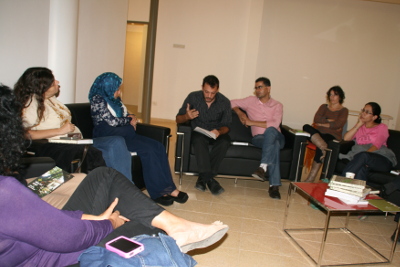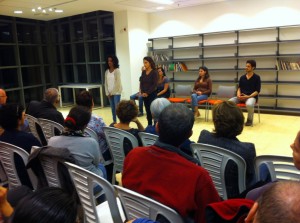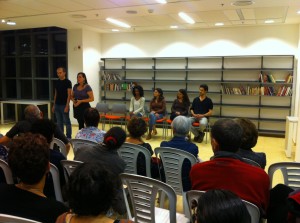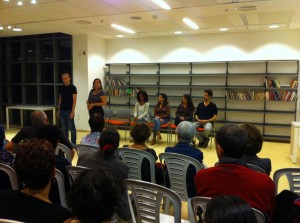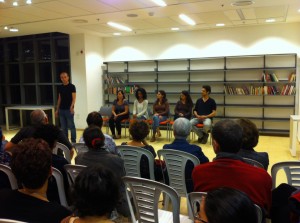Opening event of SFP year of activity 2013-2014
The SFP opened this year with a seminar for group facilitators, lecture and play focusing on issues of the current political situation and change. The event took place on November 13th at the Fred Segal Peace and Friendship Library.
Nava Sonnenschein and Wasim Biroumi presented the projects that the School for Peace will be running this upcoming year. Wasim recently joined the SFP staff as senior program director. Trained at the SFP, Wasim is an educational and clinical psychologist. This year the SFP will be running: courses at the Ben Gurion University and Tel Aviv University; a course training group facilitators; a course for mental health professionals; a course for Israeli and Palestinian high school literature teachers to teach each other’s literature; and a program for Palestinian and Jewish high school students.
Wasim spoke of a new bimonthly forum for facilitators, and the opening of a film series to be held at the Peace library. Also planned at the SFP is a Masters program on conflict resolution, and developing the library into a center for workshops and conferences on the conflict.
Roi Silberberg, presented a paper on the subject of his doctoral research on peace education: “Neve Shalom as a case study for post-colonial peace education”. Silberberg presented the dilemma that the post-colonialist approach also ends up enforcing essencialized identities. A discussion unfolded on this dilemma and its connection to the work that we do at the School for Peace. Facilitators also discussed issues relating to the conflict, which they deal with in their work and day to day lives.
Later we were joined by members of the village, more School for Peace graduates and others to watch a play – put on by students of the theatre director Nola Chilton from the theatre program at Tel Aviv University – called “Tikvah Marah [Dark Hope]”.
The play brought to light cases of shocking deeds done towards Palestinians by the Israeli army and settlers as part of the occupation, from the testimonies collected by Ta’ayush activists. The play Dark Hope is based on a book by David Shulman, “Dark Hope: working for peace in Israel and Palestine”. In this book Shulman reveals the impressions he got during his time as an activist in the organization Ta’ayush – an organization working directly for the sake of peace, in the occupied territories and Israel. Ta’ayush work is based on full Arab-Jewish partnership. After the play there was a discussion between the actors and audience about the play’s powerful effect on audiences, and its potential to open a dialogue.

